
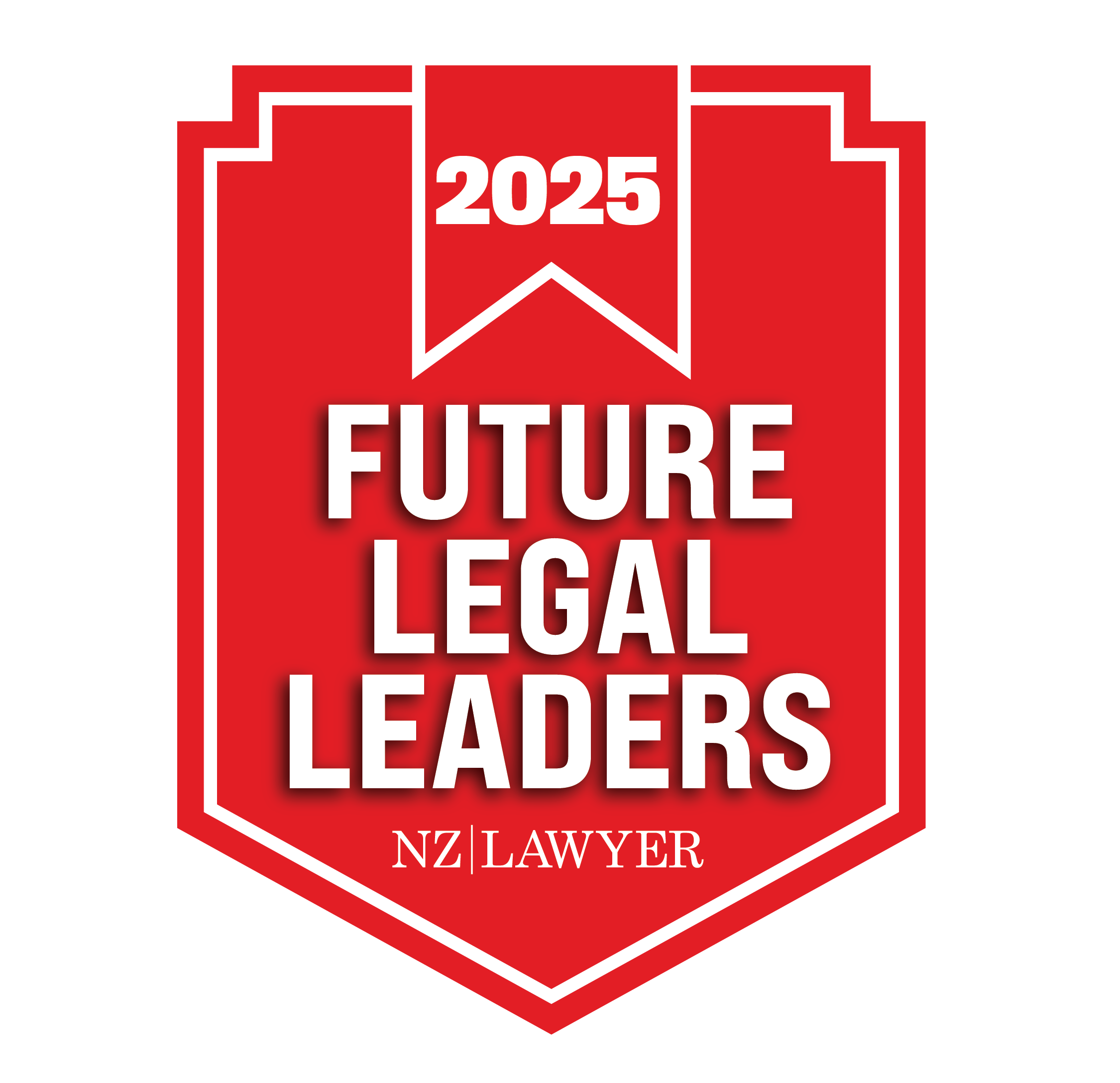
Jump to winners | Jump to methodology
The legal profession is a fast-paced and ever-evolving field, shaped by shifting legislation, newly enacted laws and landmark precedents. To stay ahead, the best lawyers must continuously adapt, refine their expertise and navigate the complexities of an ever-changing legal landscape.
This vibrancy is led by 2025’s Future Legal leaders, a group of lawyers committed and passionate about their careers. Their achievements, reputations and recommendations from senior colleagues were all considered before Australasian Lawyer and NZ Lawyer named the profession’s brightest young stars.
The cohort covers all areas of law including:
commercial property
insurance litigation and dispute resolution
employment practices liability
commercial litigation
construction law
civil litigation
environmental law
This wide cross section mirrors the thoughts of Tony Herring, partner at Gibson Sheat Lawyers and president of the Law Association of New Zealand.
He highlights the following areas as popular among younger lawyers:
“In New Zealand, Māori legal issues and Treaty law are gaining strong interest”
“Environmental and climate law is also drawing attention, with its urgent relevance and potential for meaningful impact in shaping policy and corporate accountability”
“Technology, privacy and cyber law have surged in popularity, offering opportunities to work on cutting-edge legal challenges in an AI-driven world”
“Human rights and public law remain a magnet for those driven by social justice and a desire to create systemic change”
“Even within corporate practice, there’s a growing appeal in ESG-focused work, where lawyers can help businesses align with sustainability goals and ethical governance”
Herring says, “These emerging sectors align closely with the values, purpose and curiosity of the next generation of legal professionals.”
This desire to become an expert in a particular area has also been noticed by Louise Hvala, CEO of Gatehouse Legal Recruitment based in Melbourne.
“We are also seeing more and more lawyers choosing to specialise earlier in their careers,” she says. “This is often driven by a desire to develop deep expertise, stand out in a competitive market and align their work with their long-term interests and values.”
While having a specialism is key, it is crucial for Future Legal Leaders to possess additional attributes enabling them to shape and drive the profession forward.
Herring says, “I believe that a future legal leader needs to be visionary, culturally grounded and technologically fluent. They need the foresight to navigate emerging challenges like AI, climate law and digital privacy while maintaining a strong understanding of black letter law and having an ethical compass and a commitment to justice.”
Hvala pinpoints the skills imperative for Future Legal Leaders:
authentic and values driven: “They need to be genuine, fair and consistent to earn trust and respect. In close-knit legal markets like Australia and New Zealand, integrity matters as people notice how you lead”
commercially minded: “Clients expect more than legal advice they want practical, business-focused solutions. Future legal leaders need to be fluent in the language of business including risk, strategy and operational context, as well as having a deep understanding of their client’s industry and challenges”
strong communicators: “Great leaders know how to listen, give clear feedback and bring people together. They’re approachable, collaborative and can manage difficult conversations with care1”
focused on developing others: “Building strong teams means mentoring, guiding and supporting growth. Leaders who invest in their people help create loyalty, capability and long-term success”
adaptable and future focused: “With the pace of change in law and business, leaders must be open to new ways of thinking, embrace technology and guide their teams through ongoing change”
Anand Ranchhod, managing director at CoLegal, underlines that for lawyers to be successful, they have to be equipped with technical skills that can be applied.
“Firms need those that can hit the ground running with a certain degree of autonomy in the work due to client expectations,” he says. “Beyond the technical, they are wanting well-rounded individuals that will be positive contributors and have a proactive attitude to work.”
As well as for the profession, the Future Legal Leaders 2025 are a collection of individuals invaluable to their firms. This is illustrated by Thomson Reuters data, which shows that attracting and retaining talent are their top priorities and biggest challenges in Australia.
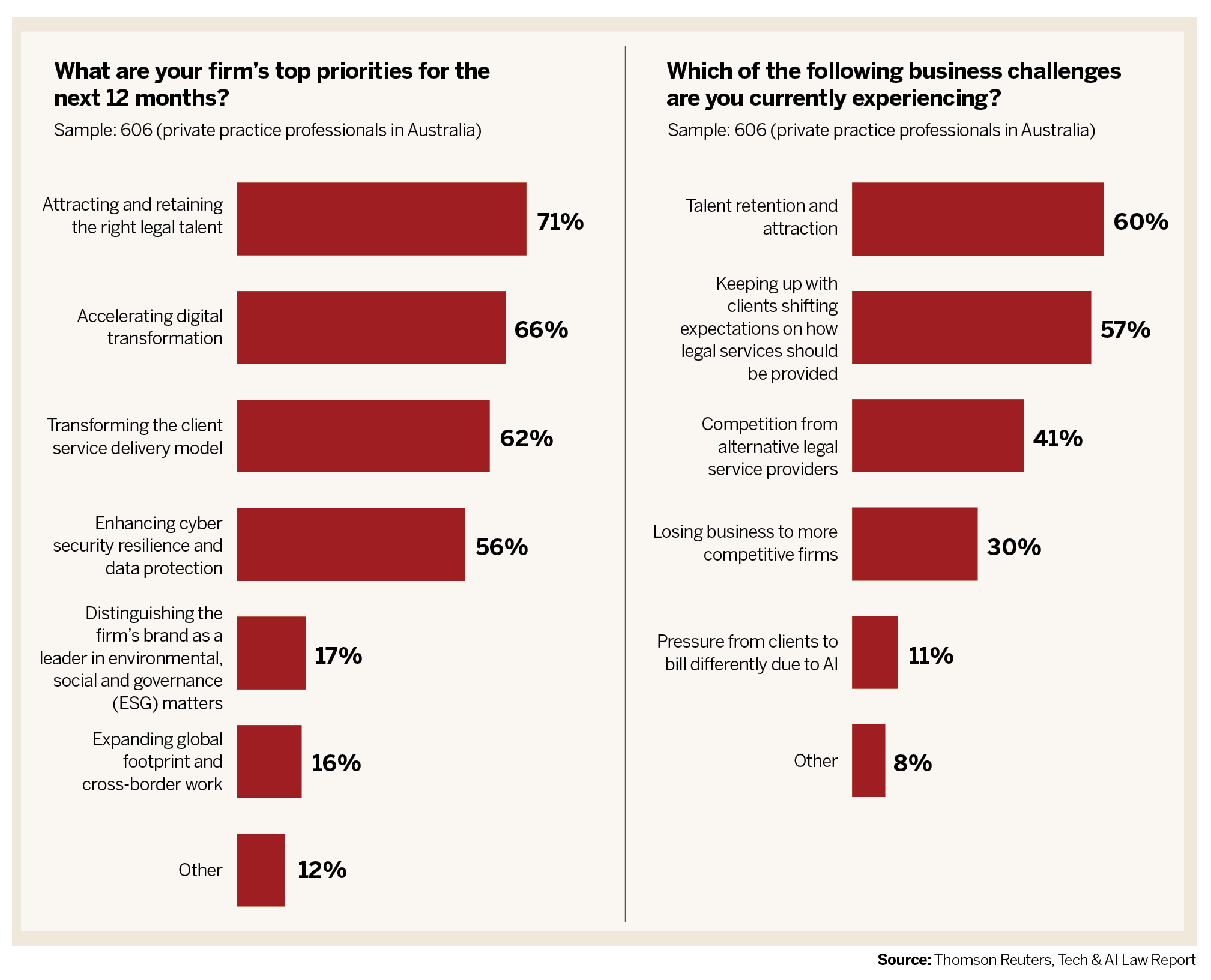
The URBIS 2022 National Profile of Solicitors shows there are 90,329 practicing solicitors in Australia, with the largest proportion registered in New South Wales (42%). Their age profile data reveals that only 35% are under 35 years of age, highlighting the challenge to make an impact and the expectations on them to carry the profession forward.
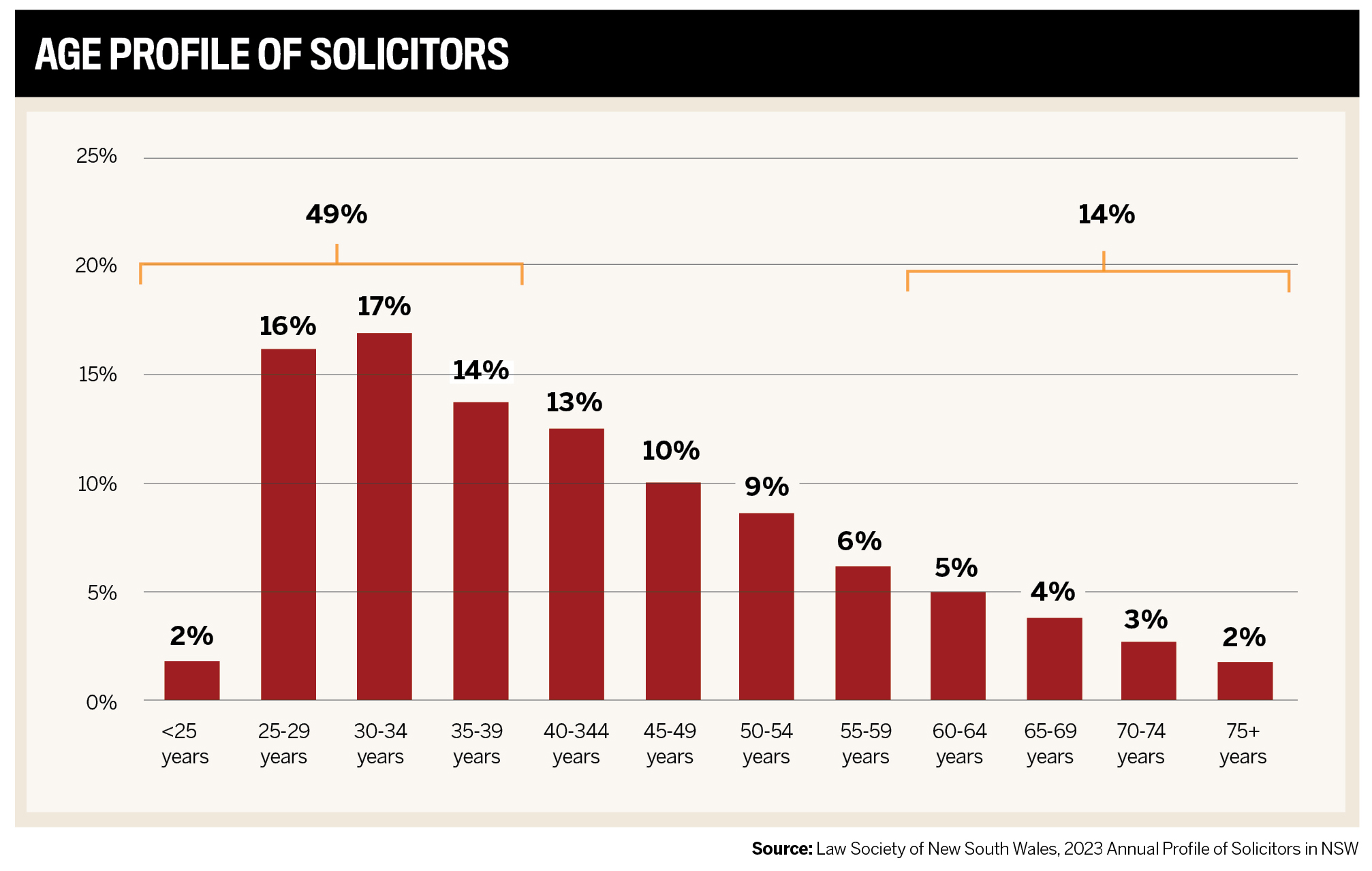
Recruitment specialists Robert Walters’ information highlights that junior lawyers are the fastest growing title across the Australian industry.
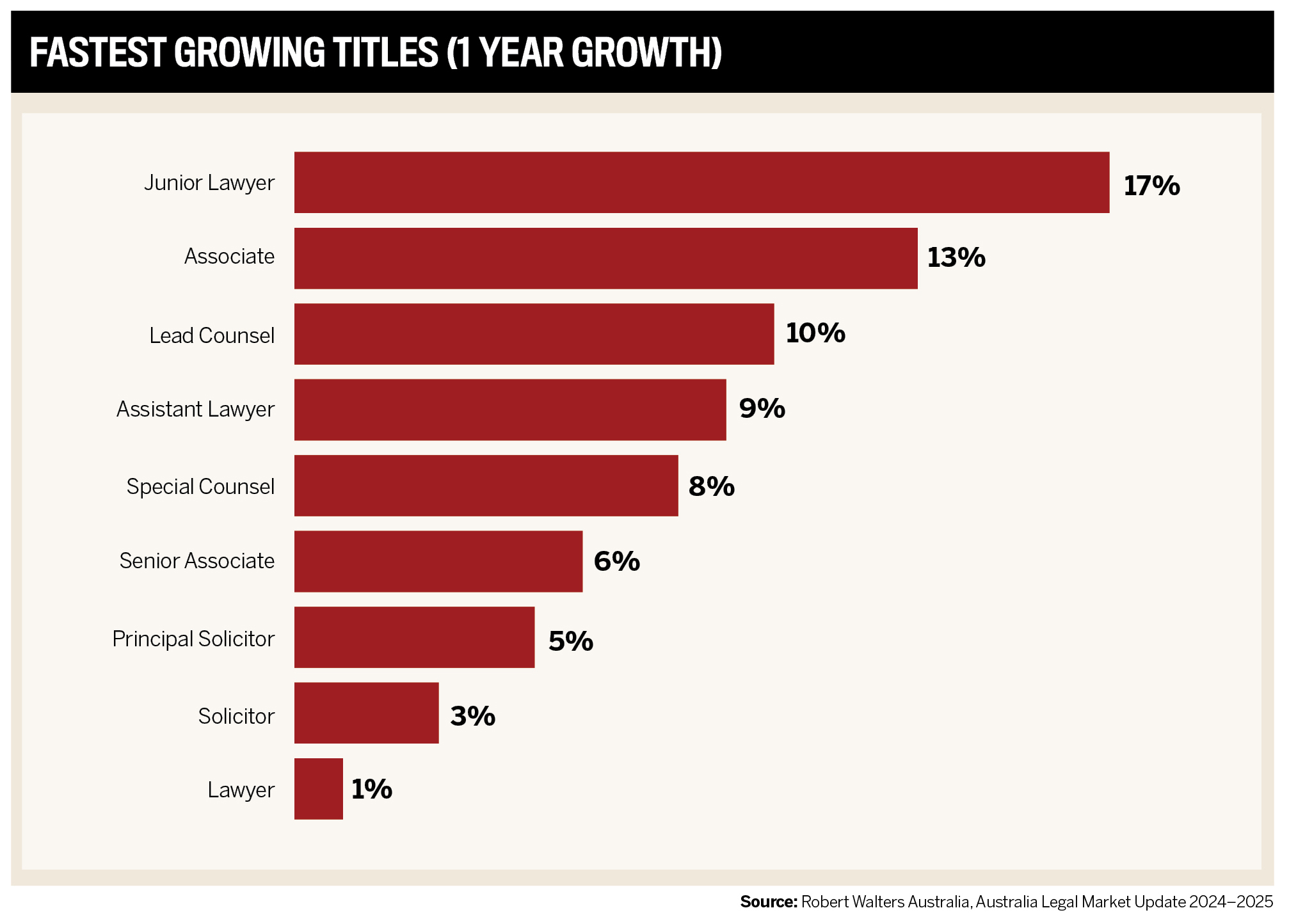
This is coupled with Thomson Reuters reporting, “The 2024 fiscal year ended with the average Australian law firm increasing its profits at the fastest rate the region has experienced since at least FY 2015.”
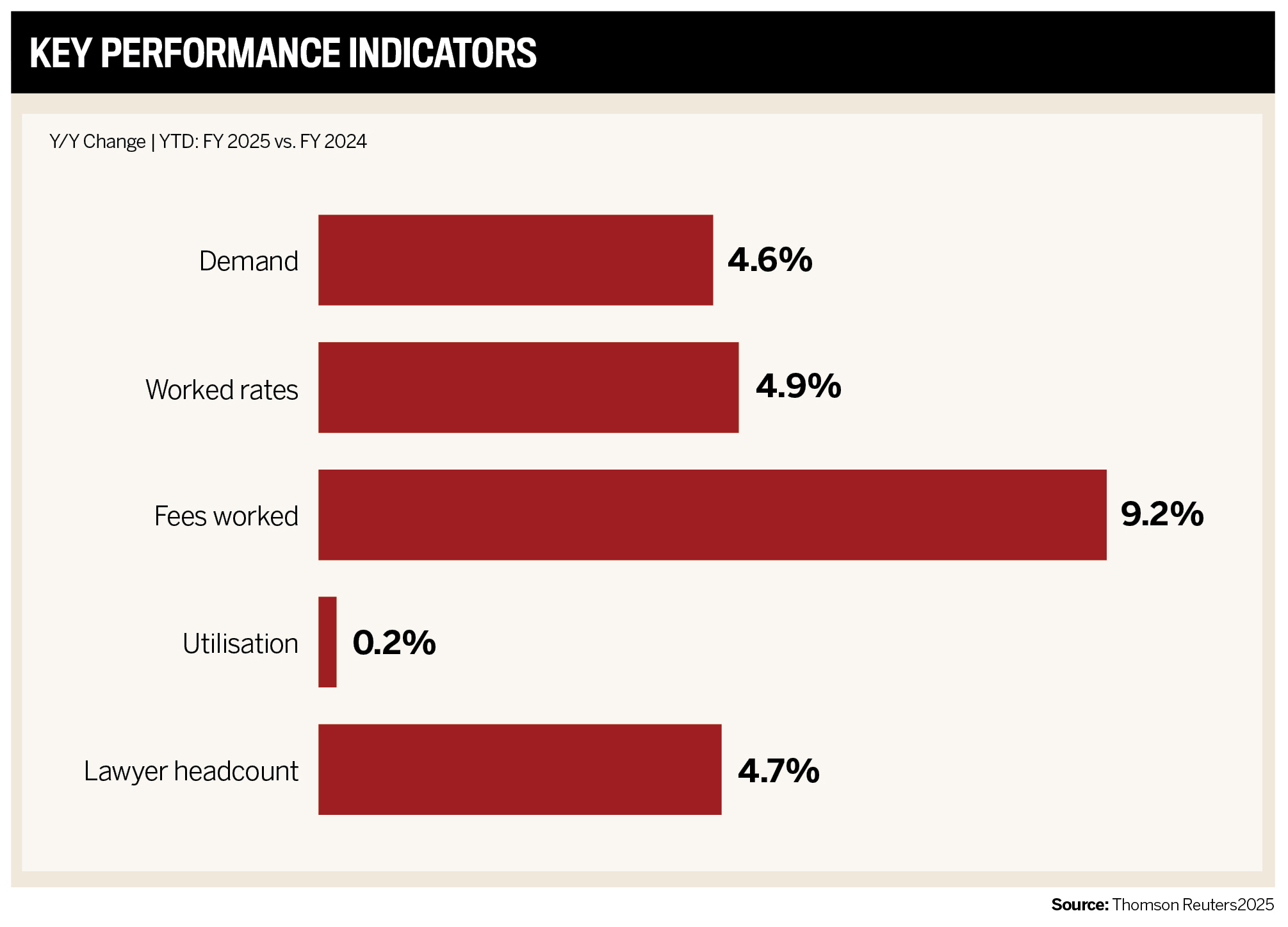
While in New Zealand, it has been a more challenging environment for law firms, with Thomson Reuters stating in the 2025 Report on the State of the New Zealand Legal Market that the “full fiscal year performance in 2024 was essentially flat compared to 2023.”
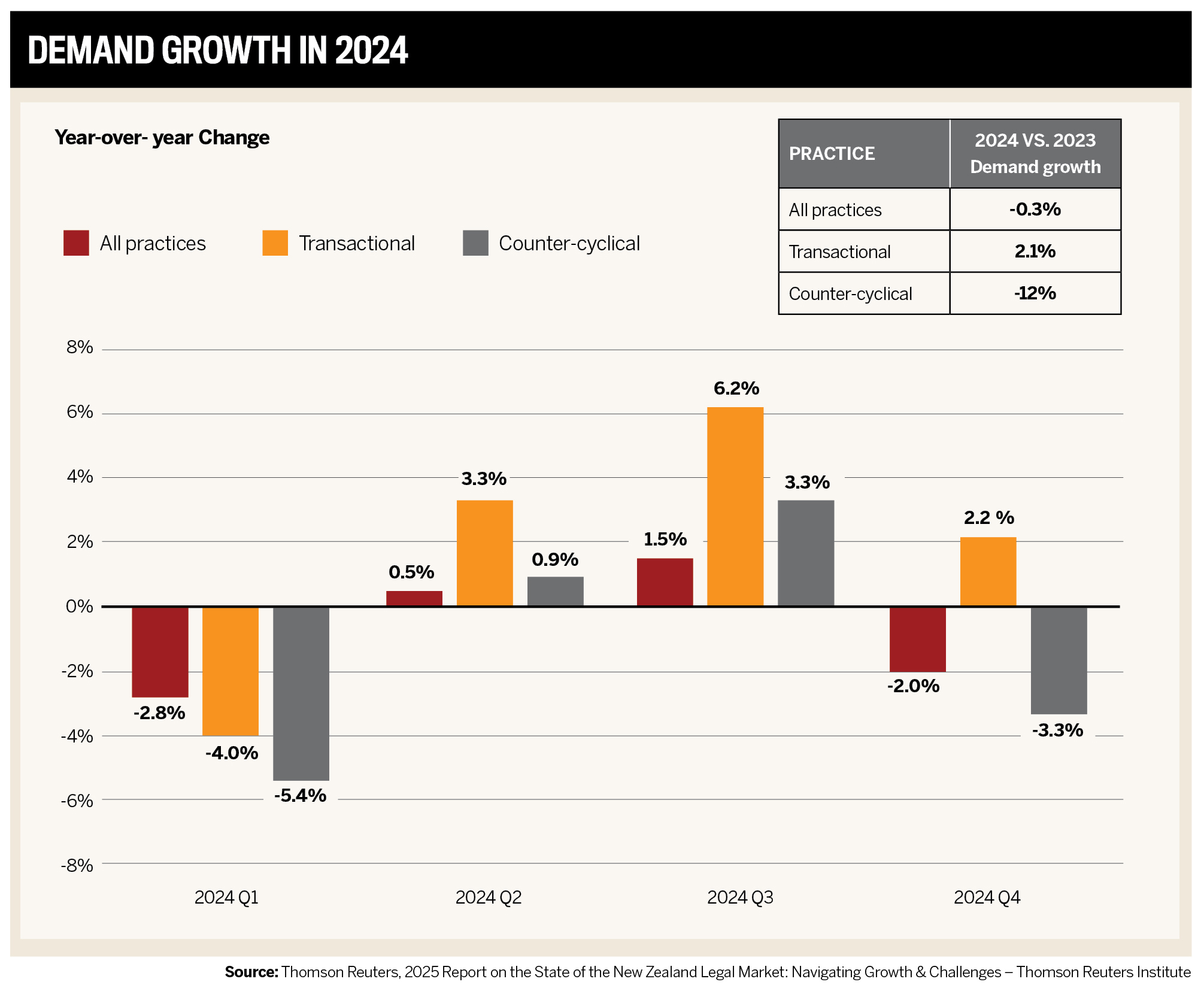
These trends point to both opportunities and expectations on the shoulders of the best young lawyers in both Australia and New Zealand for different reasons. The Future Law Leaders 2025 are those primed to drive forward as examples of excellence.
“Collaboration and teamwork across disciplines and cultures are increasingly expected, especially in hybrid and global environments,” says Herring. “A strong growth mindset, openness to feedback, curiosity and the resilience to learn from setbacks are what set future leaders apart from the rest.”
While Ranchhod emphasises the need for the best young leaders to be commercially aware.
He says, “Future leaders in the NZ legal market need to be strong relationship builders and be able to demonstrate their value as well as efficiency to clients in order to compete for work in a cost-conscious market, where clients may be cautious and selective as to whom they work with.”
Linda Zeng (27 years old), senior associate at Gilchrist Connell, sees the need to be well-rounded and develop contrasting skill sets.
“I aim to be a leader who is stern when necessary, ensuring that standards are met and goals are achieved,” she says. “At the same time, I want to be respectful and considerate, understanding the needs and perspectives of my team members.”
Success is defined by several key principles for Zeng. She aims to deliver meticulous and clean work that is sustainable over time, with careful consideration and compassion for all parties.
Collective responsibility also stands out as a barometer to her of being a leader.
Zeng says, “Success means working together seamlessly as a team, where each member contributes their strengths and collaborates towards a common goal. In this context, there is no such thing as a win or a loss; rather, it is about achieving the best possible outcome for all parties involved.”


For Samantha Murphy (34 years old), her leadership efforts are focused on her speciality, planning and environmental law.
The Maddocks senior associate advises both public and private sector clients.
“To me, success means earning and maintaining my clients’ trust on critical matters while contributing positively to the regulation of our environment,” she says.

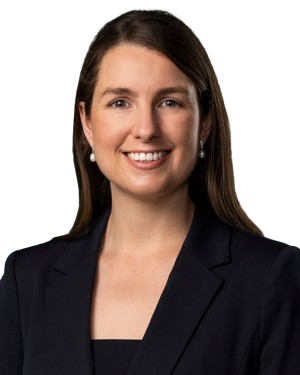
In the view of another Future Legal Leader, there are two adjacent strategies.
Sandpiper Immigration Lawyers’ Samantha Smith (35 years old) sees the routes to success as independent of each other.
“As a lawyer, it’s if the client goes home satisfied that we have given them our absolute best, even if the result doesn’t go our way,” she says. “As a leader, it’s if staff feel safe to be themselves and ask for what they need to achieve success in work and life.”


Underlining her credentials to move the needle in the Australian immigration space, Smith has worked on securing humanitarian visas for the family members of Afghan citizens who fled from the Taliban.
She also stood out for dealing with a company’s obligations to Australian Border Force as a Standard Business Sponsor. This involved reviewing documents, speaking to visa applicants and the proposer to draft a statutory declaration outlining the applicant’s key biographical information. There was also a need to undertake country research to develop an appendix of relevant and recent information, establishing if the applicant’s profile is at risk of harm from groups and for what reasons. Smith also liaised with psychologists for medical evidence to support ‘compelling reasons’ for applicants to be granted the visa.
She says, “I develop a desire to protect and defend clients or to help them face down their challenges so that the hard work, huge financial investment and personal sacrifices they’ve had to make to reach Australia don’t amount to nothing.”
Smith commonly makes a personal connection with clients, and this gives her a better understanding of the nuances of their case. This is achieved even in instances where the client requires the use of an interpreter.
Oftentimes it’s a family member requiring Smith to maintain her professional composure, even in an emotionally challenging situation for the client.
“Where the interpreter has been through the asylum process themselves, they may be tempted to advise their relative to answer in a particular way, as they have somewhat of an understanding of the criteria and believe they know what we are asking for,” she says. “We have to remind the interpreter that we are just trying to understand the situation; there are no right or wrong answers, and anything that is said remains confidential.”
Another of the 2025 cohort of Future Legal Leaders, Chantelle Holland (34 years old) specialises in workplace law and dispute resolution.
The McCaw Lewis Lawyers associate’s ability to be people focused makes her suited to this area. Hollands is taking steps to upskill and increase her cultural competency in Te Ao Māori, completing the He Papa Tikanga course through Te Wānanga o Aotearoa.
She says, “The application of tikanga Māori in legal practice is becoming increasingly relevant. We particularly see it in an employment law context – employers and employees alike are undertaking to uphold tikanga values in relationships, and it is important as a lawyer to be able to understand the meaning and application of these values in context.”

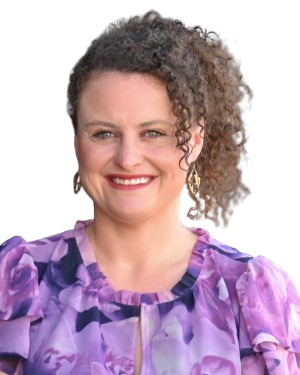
Cyber and technology is where Zeng specialises. An analytical mindset enables her to approach complex problems methodically and find innovative solutions.
“Having a STEM background further enhances my ability to analyse forensic findings and understand complex technical concepts, which is crucial for applying this to legal concepts and advising on legal obligations where it intersects with technological concepts,” she says.
Her genuine interest in the industry keeps her up to date with the latest advancements in technology and cybersecurity. When combined with her competitive edge from her sporting background at international level as an ice skater, it makes Zeng a formidable operator.
She says, “My experience as an elite athlete has honed these traits, allowing me to excel under pressure and maintain focus on my goals.”
This was evident in a case where Zeng advised a client on a strategy to limit the harm that was likely to be caused to a vulnerable individual if the client took the required steps to notify them of an incident. She guided the client through a process to demonstrate to the Office of the Australian Information Commissioner the resultant harm, obtaining a novel exemption from the notification obligations.
Zeng explored with the client alternative methods for notifying the individual with the client, but no options were suitable. This led her to seek a declaration to exempt it from notifying the individual.
“Understanding the overarching purpose of the Privacy Act, along with the practical component of protecting individuals from serious harm arising from an incident, was crucial,” Zeng says. “This reflects my ability to be insightful and compassionate and to understand different vulnerability factors with guidance from industry specialists. It also demonstrates my capacity to blend these factors together empathetically to ensure the client is making informed decisions.”
Similarly informed is Murphy, who has advised on issues around compulsory acquisition and land access issues, Crown land, native title and Aboriginal cultural heritage.
Acknowledging the need to protect Australia’s history, she says, “In recent years, we are also seeing greater recognition of First Nations voices in how our environment is managed. I’m excited to see whether these developments can lead to better environmental outcomes for Australia and empower indigenous communities to continue to care for country.”
Murphy was seconded to the Commonwealth Department of Climate Change, Energy, the Environment, and Water, working on the federal government’s Nature Positive law reforms.
She found this to be challenging yet professionally rewarding.
“The experience that comes with being able to create something new is something I have taken away from that and been able to apply elsewhere, including when advising private sector clients on new and emerging areas of law, or advising local and state government clients on the development and implementation of government policies and programs,” says Murphy.
Part of what drives Murphy is the dynamic and broad nature of environmental law. This results in her working across an array of matters, and she relishes being presented with a new legal question.
“Environmental law is far-reaching and complex. The health of our environment impacts all of us, which is why we have such an intricate system of laws regulating how we interact with it,” she says. “Working in environmental law, you need to have patience to unpick those intricacies while also maintaining a view of the bigger picture or the overall strategy or objective.”
The warming climate and increase in extreme weather events are acting as an increasing stressor on the environment, which can give rise to new legal issues or prompt policy change.
“I’ve advised clients on both ends of this spectrum, from emissions reporting to disaster recovery, and we can see there is only more change to come. I see my role as assisting clients to navigate those changes head-on, and to find a pathway through,” says Murphy.
Experience in the profession has enabled Holland to realise the importance of delegation to ensure that work is being completed as efficiently as possible, both from a chargeout and capacity perspective.
Holland says, “I want to be an encouraging leader who is deeply invested in the development, learning and progression of those around me.”
Adapting and thinking outside of her legal training has been required of Smith.
She has developed her firm’s brand identity, specifically locating a target market and articulating what the firm is and what services they will offer.
Smith says, “It’s about positioning ourselves in the market and making sure who we are and how we approach our work is innately felt by any person who comes across our website and social platforms.”
There is also a responsibility to undertake financial forecasting, which means she has to record what work has been billed and what is left to be billed, along with tracking cashflow and expenses.
Smith’s previous position at the firm saw her leaving due to feeling overworked, and she has since been diagnosed with ADHD and chronic fatigue syndrome. She shares these issues in team meetings and is open about creating an environment that is compatible with diverse needs.
“I know I’m not alone in needing an adjustment to the way we approach work,” she says. “I want the place where I work to be a place where people want to work. We are not robots, and we shouldn’t work like them.”
Her mindset that by identifying problems and discussing them openly, it removes fear of failure and mental blocks.
She says, “It makes it so that everyone is more willing to seek help, to say ‘I don’t know’ to say ‘This is too hard for me right now’. Now we know there’s an issue, we can work together to address it. My hope is that staff who move on to other workplaces might take some of these practices with them.”
Last November, Australasian Lawyer and NZ Lawyer accepted nominations for the 2025 Future Legal Leaders (previously Rising Stars). The standout young stars from the Australian and New Zealand legal profession were invited to put their names forward; those who knew of and wished to highlight such talent were also asked to submit nominations. Nominees needed to be 35 or younger as of 31 January 2025. They had to have committed to a career in the legal profession and shown a clear passion for the industry. The team also required nominees to cite their current position, responsibilities and key achievements over the past 12 months.
The team considered recommendations from managers and senior industry professionals in the review process conducted after the nomination period. After considering all aspects of the many submissions received, 87 emerged as the brightest young stars of the batch.